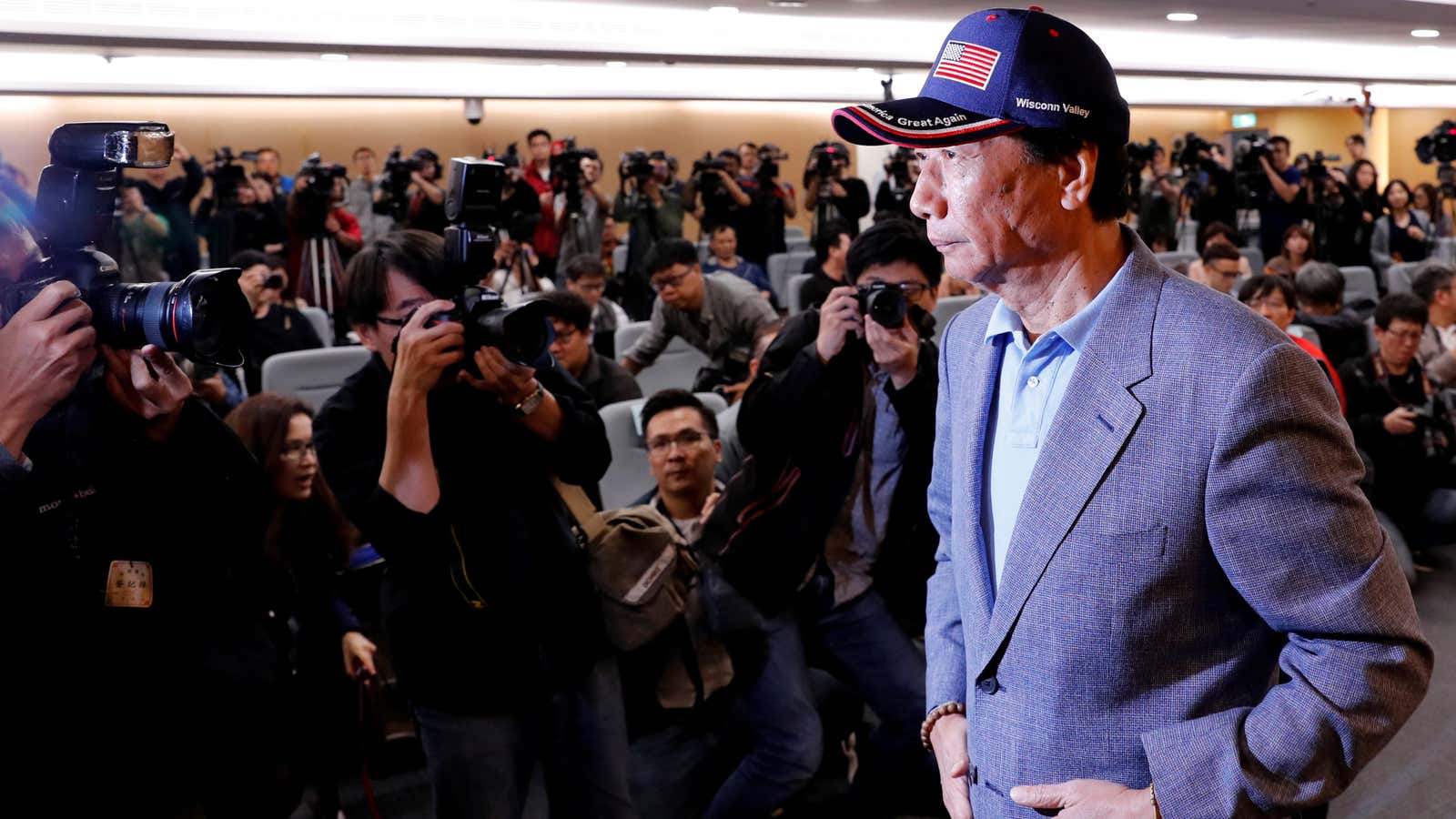A self-made tycoon who earned a fortune by assembling iPhones for Apple is promising Taiwan he’ll impose a special tax on the ultra-rich if he gets to become president.
Terry Gou, the 68-year-old founder of Foxconn Technology Group, was described by one Taiwanese magazine as “the most powerful freshman in politics” (link in Chinese) after he announced plans to compete in next year’s presidential election, hoping to be selected as the opposition Kuomintang (KMT) party’s candidate. The party, which campaigns for closer ties with China, is holding its primary this week and will announce the winner on Monday (July 15) based on the result of landline phone polls. Voters will be asked how he stacks up against president Tsai Ing-wen, who’ll be running for a second term, as well as how he stacks up against other candidates.
The election comes at a time when many are concerned about their salaries and cost of living. Last November, the Kuomintang won 15 of 22 mayoral and county magistrate seats in local elections on promises of focusing on the economy, handing Tsai’s Democratic Progressive Party a crushing defeat.
According to Wei-Ting Yen, an assistant professor in government at Franklin and Marshall College in the US, Gou’s image as a successful, self-made businessman makes him a strong contender. Despite trailing behind Kaohsiung city mayor Han Kuo-yu in several polls, Yen thinks that Gou’s business success could convince the KMT’s voters that he will deliver economic results.
Gou has been highlighting a tax proposal aiming at the ultra-rich in Taiwan since he began his campaign, and on July 6 he reiterated this policy through a Facebook post (link in Chinese), just ahead of the start of telephone polling for the primary. He said he would impose a tax on Taiwan’s 1,000 richest people that he expected could generate at least $5 billion annually—though rivals have questioned his numbers—which he plans to devote to social welfare spending such as public kindergartens and daycare centers, and social housing projects. He referenced similar appeals made by fellow billionaires like Bill Gates and Warren Buffett who have called for the US government to increase taxes on the ultra-rich.
“When all citizens are safe and self-sufficient, businesses can have fewer concerns,” Gou wrote in the Facebook post. “That’s why I propose to impose a tax on Taiwan’s ultra-rich, and I’m very firm about this proposal.”
Han is a formidable rival though—he jumped into the presidential race after calls from his supporters to run, just months after pulling off an upset victory to become mayor of Kaohsiung city, long a DPP stronghold. His political rallies draw large numbers of people, and in recent televised debates he has emphasized the gap between rich and poor, blaming the current administration for not distributing economic benefits properly. He wants to address these issues by establishing an economic fund to help farmers, fishermen, women, and other lower-income groups, and is also proposing new negotiations for free-trade agreements.
Gou first revealed his intention to run for Taiwan’s highest office in April, when he said that the sea goddess Mazu came into his dreams and asked him to “do good things for our suffering people, give hope to the youth, and contribute to cross-Strait peace,” a reference to China, which claims Taiwan is a part of “one China.” The island, however, is self-governed, with its own legislature and a court system that ushered in Asia’s first same-sex marriages.
In May, Gou said that Taiwan plays a key role in the ongoing trade war between China and the US, and only if he becomes Taiwan’s next president, can the island truly elaborate its unique advantages. “I can increase Taiwan’s profit, help the US reach its goals, facilitate a successful structural transition for China, and help Taiwan create another economic miracle,” Gou said in a speech to executives from Taiwan’s electronic industry.
“Gou is capable of framing a public image that he can maintain very good relationships with both the US and China, and such an image can be appealing to many Taiwanese people,” said Yen.
But despite the KMT’s strong showing in last year’s local polls, analysts have cautioned against seeing the result as favoring its stance on friendlier ties with the mainland. In fact, both Gou and Han have had to alter the direction of their China policy in recent weeks, and have come under pressure over their contacts with China, after president Tsai’s popularity was boosted by her outspoken support for the anti-extradition-bill movement in Hong Kong. They are now both distancing themselves from Beijing, and reiterating their opposition to the “one country, two systems” model under which Hong Kong returned to China in 1997.
Gou’s attempts to transform how voters see his business and political ties to China, where Foxconn employs hundreds of thousands of people, may convince some, says Liu Chieh-hsu, a Taiwanese voter in his 30s.
“In recent weeks, we have seen Gou repeatedly emphasizing how China is the one that needs to rely on him rather than the other way around,” Liu explains, though he doesn’t plan to vote for Gou himself if he wins the nomination.
Gou has also tried to play up another possible selling point—the comparison drawn between him and US president Donald Trump in Taiwanese media as successful businessmen with no prior political background who are prone to taking provocative stances (paywall) as politicians.
In May, he even won an invitation to the White House not long after announcing his presidential bid. Though Trump and Gou didn’t discuss support for his presidential campaign, Gou still seized the opportunity to turn the meeting into a political one. In a Facebook post (link in ChinesE) about the visit, Gou showed off the three souvenirs that Trump gave him while saying his “old friend” Trump told him that “being a president is a tough job.” He didn’t forget to take a page from Trump’s campaign strategy by adding the hashtag “#MakeOurNationsGreatAgain” at the end of the post.
